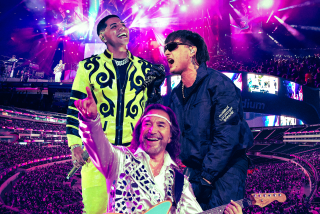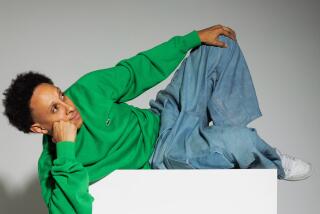Comedy and music fill the bill at revived Un-Cabaret
Beth Lapides didn’t even know she was looking to bring back her legendary Un-Cabaret comedy show until she saw the hidden backroom at the restaurant First and Hope, with its Art Deco styling and speak-easy feel.
The swanky location inspired Lapides to resurrect the Un-Cabaret that she and co-producer Greg Miller had created in the early ‘90s and which had fueled a new generation of alternative comedy around Los Angeles. In response to the hacky acts she found at mainstream venues back then, she wanted a show that was “un-homophobic, un-xenophobic, un-misogynistic,” she recalls. Hence, Un-Cabaret.
Comedians had to tell their own true stories. They could bring notes onstage, but no props. Every Sunday for seven years, the clan of comics who got real included Dana Gould, Margaret Cho, Patton Oswalt, Janeane Garofalo, Bob Odenkirk, David Cross, Kathy Griffin and Julia Sweeney.
The new incarnation of Un-Cabaret offers the original’s spontaneity. The night after Whitney Houston died, Cho spoke movingly about how much the singer meant to her, before launching into a hilarious tirade about Karl Lagerfeld’s opinion of Adele. Lauren Weedman was a hit with her story about corresponding with a possible serial killer. Then Gould got up and gave this apt description of the downtown locale: “The feel of a nightclub, the commute of jury duty.”
The weekly Un-Cabaret 2012 show — it’s presented on Sunday night — has many of the same names as the original, but the new version also features music. With co-producer and musical director Mitch Kaplan, Lapides has added singers and bands that perform their own work, “the same way we have original storytelling voices in comedy,” she says.
Lapides admits she was initially hesitant to bring back the show. “As an artist you never want to repeat yourself,” she says. At the same time, she missed the Un-Cab community. “With where we are in the world now, I need to hear how everyone is coping.”
She was also given a performance space that couldn’t be denied — the Bar Fedora room in the back of First and Hope. “The first thing that came out of my mouth to Beth was, ‘You’ve got to do Un-Cabaret again,’” says Kaplan, which surprised them both, because he’d never seen the show. She realized, “OK, fine, Un-Cabaret is my destiny. I accept it.”
With so many popular alternative venues in town these days, why play Un-Cab? “It’s in the moment and genuine and autobiographical,” Gould says a few days after the show. “There are no other rooms with that stipulation. That can’t be underestimated.”
Oswalt, Scott Thompson, Mary Lynn Rajskub and Greg Behrendt are among many known entities scheduled for shows, along with newer names such as Miss Coco Peru and Selene Luna. “Comedy is so much about approval, and in Un-Cab you have to be able to break down that wall and connect with people,” says Cho.
The show has played to packed audiences since its January launch. “So many people are going through such massive changes in their lives,” Lapides says. “Telling the stories that we’re living, in a really funny way, is compelling.”
They’re not just bringing the laughs. On a recent night, the band Chromium Heart played heartfelt songs, while Timur and the Dime Museum put on a punk-operatic spectacle. Lapides posits that the music provides an emotional counterpoint to the cerebral humor. “Without the music as release, it’s harder to take in this very real kind of comedy,” she says. “We want to take people on a very cathartic emotional ride.”
Pianist Kaplan and drummer Denise Fraser remain onstage throughout the show, adding musical accompaniment and the occasional rim shot to the comic proceedings. “It’s like a roller coaster ride,” says Kaplan, whose extensive musical background includes shows with comedians Sandra Bernhard and Ana Gasteyer. “As an audience member even being onstage, I never know quite where the performers are going to go with their pieces.”
Gould likens the atmosphere to a ‘60s-era jazz club, the kind of place Lenny Bruce used to play. Cho riffs on the comparison. “The comedy is kind of a jazz improv,” Cho notes. “We’re all session players, we have our jobs during the week, and then we take our talents to Un-Cab and do this elongated improv session, in a studio, live, that’ll never be done again.”
More to Read
The biggest entertainment stories
Get our big stories about Hollywood, film, television, music, arts, culture and more right in your inbox as soon as they publish.
You may occasionally receive promotional content from the Los Angeles Times.










